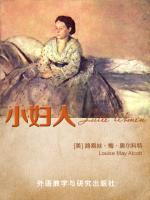Book Review
Book Review: The Female Consciousness in Little Women
As a “novel for girls” written by Louisa May Alcott, Little Women depicts the coming-of-age-story of four sisters during the American Civil war, recording their pure love experiences and pursuit of ideals and destinations. Since published in 1868, Little Woman has been considered as a moral family diary in the form of a novel, and remains a beloved favorite for countless generations of young readers.
The groundbreaking novel emerged with the first feminist movement, and came out at the rise of women's literature. It combines features of “female author”, “female consciousness” and “female characteristics”, which most literary scholars define as essential conditions of female literature, and then deconstructs the patriarchal society and further demonstrates women's common charm.
Meg, pursuing true love and contented in poverty, reflects a woman’s strength in emotion; Jo, independent and devoted to writing, mirrors a woman’s strength in career; Beth, sensitive and full of sympathy, embodies a woman’s strength in morality; and Amy, a little spoiled but persistent in art, reflects a woman’s strength in self-improvement of human nature.
Although the four sisters of the Marchs are close and intimate, the author Alcott intentionally divides them into two groups. “Meg was Amy's confidante and monitor, and by some strange attraction of opposite Jo was gentle Beth's. To Jo alone did the shy child tell her thoughts, and over her big harum-scarum sister Beth unconsciously exercised more influence than anyone in the family. The two older girls were a great deal to one another, but each took one of the younger sisters into her keeping and watched over her in her own way.” Alcott writes, implying the coordination of their different personalities and the society of the time.
Joe and Beth are a couple of the most sacrificial characters. Jo is grumpy as fire while Beth is kindly as water, but they neither fit the definition of traditional women in the 19th century. The boyish Joe harbors a big ambition, against the image of a lady in the conventional sense. It is Jo’s independent human dignity that shapes her unique characters and pursuit of career, despite misunderstandings and rejections from the mainstream society. Beth is the same case. Too shy to adapt to school life, she dropped out and took care of the whole family without any complain, seeming to exist just for others. And this led to Beth apart from the complex society, an innocent angle cannot live in the reality.
In contrast, Meg and Amy basically meet the expectations of the role women play in the society. Both of them had yearned for the rich life, attaching importance to appearance and etiquette. Although Meg realized the vanity of the upper class and chose a poor but honest man, and Amy gave up marrying a rich man who she didn’t love, they still receive more recognition of the secular society because of their return to the family. Maybe this is Alcott’s compromise with the common traditional view.
Obviously, Alcott have been influenced by the cultural background of social transformation and feminist movement, when conservation and progress, tradition and innovation, obedience and rebellion interweave and merge together, leaving Little Women imprint of the time, which also indicates Alcott’s historical limitations. She is in favor of self-reliance advocated by feminism, yet to some extent she supports the traditional female roles. Thus, the new female image shown in the novel is circumscribed and looks defective, the same as the female consciousness it conveys.
Generally, Little Women has woken up the female consciousness repressed and hidden in the past, bringing enjoy of reading and thinking. As Rioux writes, “It has been a foundational text not only in the history of women's literature but also in individual writers' very conception of themselves as writers and artists.” From the 1970s onward, the novel continued to draw closer ties to the evolving women's movement, and inspire women all over the world to pursue their own ideals and achieve self-person independent.



 京公网安备 11010802032529号
京公网安备 11010802032529号